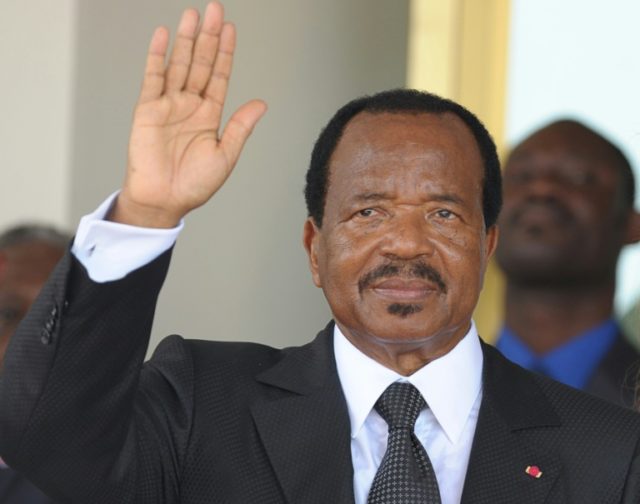President Paul Biya of Cameroon took office on Tuesday for the seventh time after a victory marred by controversy and violence in October, particularly in the English-speaking minority regions demanding independence (Cameroon is majority French-speaking).
Biya, 85, has ruled Cameroon since 1982; he served as prime minister before then from 1975-1982. He won October’s election with over 70 percent of “valid” votes, as determined by his government. A significant percentage of voters in northwest Cameroon, the English-speaking region of the country, was not able to vote as a result of ongoing violence there between government troops and separatist groups. In addition to the disenfranchisement of the region of the country where Biya is most unpopular, Biya’s presidential challengers argued that widespread electoral fraud had denied them the right to a free and fair election.
Maurice Kamto, who ran against Biya in October, has organized ongoing protests against Biya, along with opponents Cabral Libii and Joshua Osih. Kamto was arrested Tuesday along with four supporters for protesting the inauguration.
The night before the inauguration, a yet-unknown group abducted 79 schoolchildren, their teacher, principal, and school bus driver in Bamenda, a city in the nation’s northwest. On Tuesday, authorities banned the movement of any non-emergency vehicles in the city and announced widespread search and rescue operations. The government immediately blamed Anglophone separatists in the region, who have demanded the establishment of a separate sovereign nation called Ambazonia.
A spokesman for one of the largest separatist groups in the region, the Ambazonia Defense Forces, accused the government of abducting the children to later blame his group for the violence.
Biya did not address the kidnapping in his speech. Instead, he issued a blanket threat to English speakers in the northwest region to abandon their opposition to the government.
“These war-mongers who are jeopardizing our national unity and preaching secession should know that they will face not only the full force of the law but also the determination of our defense and security forces,” Biya asserted in his speech, demanding the Ambazonia fighters hand over their weapons to the government. In return, Biya claimed to have “looked closely at the frustrations and aspirations of the vast majority of our compatriots” in the embattled regions and promised “a good number of answers” to their concerns.”
Biya’s remarks at the inauguration were his first about the dispute with the Ambazonian separatists since violence escalated in late 2016. At the time, Biya’s Francophone government had begun banning English-language classes in school, translating court cases from French to English, and generally excluding English from government duties despite having the legal obligation to use both official languages. The result of this crackdown on English was a widespread protest movement among the Anglophones, which Biya’s government responded to with violence.
In response to that violence, English-speakers declared independence as “Ambazonia” and established this Ambazonian Defense Forces.
According to Human Rights Watch (HRW), Biya’s government “used excessive force to break up at least five demonstrations organized by members of the country’s Anglophone minority” in 2016 and 2017. “Security forces, equipped with anti-riot gear including shields, helmets and tear gas, used live ammunition, including from helicopters, against demonstrators equipped at most with stones, and against unarmed bystanders, killing at least a dozen people and injuring scores.”
HRW also documented cases of Anglophones accusing the government of torture in detention.
This year, the separatists added new disruptive tactics to their protests, most notably the destruction of schools, according to HRW. Shutting down schools and other basic government functions reportedly services as a way to “force the government – whose rule the insurgents want to break away from – to see just how grave the crisis is.”

COMMENTS
Please let us know if you're having issues with commenting.